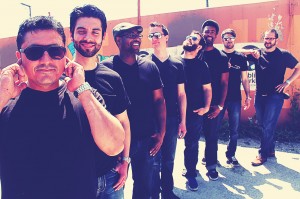This article by Brian Keigher originally appeared on the ChicagoMusic.org.
 Hometown stalwarts Chicago Afrobeat Project have presented their original take on the modern Nigerian sound known as afrobeat for a decade. Initially, the group’s shows would feature its original compositions alongside a handful of Fela Kuti songs—which makes sense, since he created this genre in Lagos more than 40 years ago. But Chicago Afrobeat Project’s new CD Nyash UP!—an African play on words of sorts with “mashup”—is an all-covers album, and does include live mashups. The album highlights some great twists on songs that you would never have thought of getting an afrobeat makeover.
Hometown stalwarts Chicago Afrobeat Project have presented their original take on the modern Nigerian sound known as afrobeat for a decade. Initially, the group’s shows would feature its original compositions alongside a handful of Fela Kuti songs—which makes sense, since he created this genre in Lagos more than 40 years ago. But Chicago Afrobeat Project’s new CD Nyash UP!—an African play on words of sorts with “mashup”—is an all-covers album, and does include live mashups. The album highlights some great twists on songs that you would never have thought of getting an afrobeat makeover.
Kuti created a unique, and now legendary, blend of West African tribal, repetitive drumming (originally featuring percussionist Tony Allen), blended with the raw urban soul sound, stabbing funky horns, saxophone solos, riffing rhythm guitar (with no solos), Earth-moving bass lines, modern keyboards and organ sounds derived from jazz, and a few Afro-Cuban musical ideas. The mixture also served as a bed for Kuti’s socially conscious lyrics, which were often harsh criticisms of the corrupt African governments, along with comments on other international issues. Chicago Afrobeat Project have also followed that socially conscience path of trying to highlight critical topics of our day.
Chicago Afrobeat Project’s new release features many of the musical influences that the band breathes in alongside Kuti’s music. These include covers ranging from Brazilian songstress Ceu, Radiohead, Talking Heads and even Led Zeppelin. The band also covers fellow Chicagoan and jazz saxophone giant Ken Vandermark as well as a version of the Marvin Gaye classic, “Inner City Blues (Make Me Wanna Holler).” Also included is a nod to another Chicago musical hero, Curtis Mayfield, on their song, “Other Cuts.” The band even takes on early British techno, ambient house music on 808 State’s “Pacific,” bringing house music back home to it’s soulful roots in Chicago—though after being morphed through an afrobeat blender. Other unexpected rock covers include interpreting System of the Down and Chicago Afrobeat Project even gets a personal stamp of approval from punk rock luminary Ian MacKay of Fugazi for the group’s great cover of his band’s “Waiting Room.” That song is mashed up with Kuti’s “Colonial Mentality” to create “Colonial Waiting Room Mentality.”
From their roots as a weekly jam session at a Lake Street loft, which quickly morphed into a solid weekly gig at the club The Note in Wicker Park, Chicago Afrobeat Project has now become a full fledged, working touring band. They hit the road for an average of one hundred plus shows a year. Its lineup has evolved throughout over the decade, reaching almost 50 past or current members since the start: including rotating dancers, horn players, percussionists and drummers. Thankfully, the high turnover rate in band membership has had a good payoff, as the band is now in top form and sounding tighter than ever. The group can feature up to a dozen members or more for a local gig, but the core of the band and it’s touring and recording lineup consists of band veterans, David Glines on guitar, Kevin Ford on keyboards, Garrick Smith on baritone sax, Angelo Garcia on tenor sax, Graham Czach on bass, Justin Boyd on drums and Danjuma Gaskin on congas.
Chicagomusic.org pinned down founding member Kevin Ford to share some insight on the longevity of the group, details about their name, and past performance highlights.
CMO: So Kevin, in the past ten years of playing shows, give me two standout highlight for you and the band.
KF: We’ve had a lot of high points, and low points, I guess, which is typical of a band that’s been together for ten years. But we’ve had some great gigs. Playing the Oregon Country Fair was pretty cool. It was kind of a hippie scene. But it was a super fun because it was a two part gig. We played our show, which was well received, but then we also played the late night jam session for everybody. It ended up being a crowd of about 3,000 people or something I think and we were playing with Bill Kreutzmann of the Grateful Dead, Scott Murawski from Max Ceek, Steve Kimock, Papa Mali and some other guys. It was really fun and part of it was the atmosphere of the festival and everything, but our gig was also really good too. Actually, the recent show we did with Seun Kuti [Fela Kuti’s son] and Egypt 80 at the House of Blues was pretty awesome. It was a pretty electric night. We were all in the best mood because it was just a great gig. We got on the bill somewhat late. We had been pestering people to try and get on this bill. We had been working with some of the people associated with FELA!, the musical, which was in town, some of which included friends of ours who are in Antibalas and we finally got on the gig and of course we were thrilled of the fact that we were doing it. But in the course of the night, we didn’t really know what to expect. We hoped there would be some collaboration, that we’d be able to jump up there with them. Of course the crowd was great there from the jump. Some of the guys from Antibalas were there that night, and some of the cast member from the play were there, Egypt 80 was there. The culmination at the very end of the night was kind of what we were hoping for, where everybody was up there jumping in. Our baritone sax player was in center stage doing a solo at one point with Egypt 80 and the rest of those guys. Of course I was super jealous of that. I think I was about to try and go over and nudge my way in on the keys and the show ended. Seun was very approachable and a cool guy and it was just a positive night.
CMO: Any low points you want to call out?
KF: I would say the low points would be anytime where the promotions and whatnot, and maybe possibly the music too, didn’t really click on a given night. We’ve had a handful of dead shows in the past. It takes a lot of work when you are traveling around to get a crowd out. You’re playing a town you’ve never played before or you don’t play that often. There are some places where you show up the first time and it’s off the chain and you know it’s a packed house. Then we’ll go back and maybe we waited too long or something or maybe we go there later and things don’t really click. It’s just really unpredictable sometimes.
CMO: Chicago being in the name in the band, is it important to you guys to music musical ambassadors for the city? Have you thought of changing your name?
KF: There was always the idea about changing our name. When the name originally came together, we didn’t really know what was going to happen with the group. I mean I’ve always been into electronic, house music and that whole scene and Scott Gendelmen, who was our percussionist player and one of the guys who introduced people together and got the band going. He had a record label and we were thinking that the most we were expecting to do with the name was put out some cool afrobeat remixes and records and maybe just some raw stuff. We thought of this name that would kind of like tell you what’s up right away. Seemed like it sort of fit with the vinyl market and with DJs and stuff like that. Where is would just pop out right away. We’re sort of this afrobeat collective of projects and Chicago’s version of it. It seemed like the name fit that original idea and then we just kept it. It’s a very descriptive name. I think we were the first, at least that we are aware of, or most people are aware of, that knew us by our city like a sports team or the NBA or something.
Chicago Afrobeat Project’s record release event concert for Nyesh Up! will be at Martyrs’ on Saturday, Jan. 26, at 9:30. Tickets are $10 and available here.
